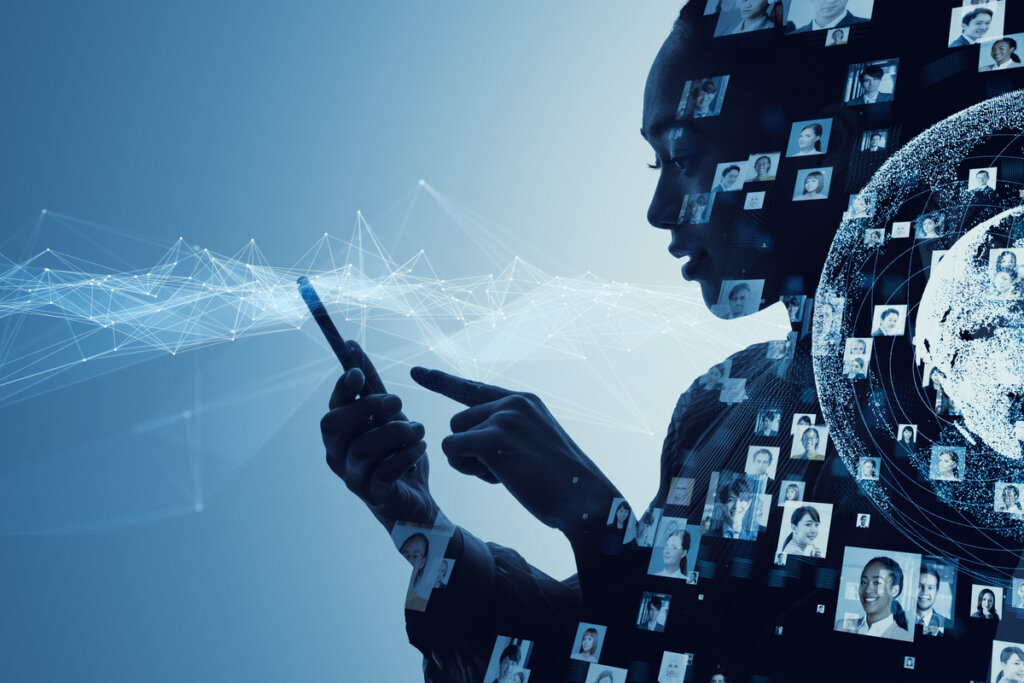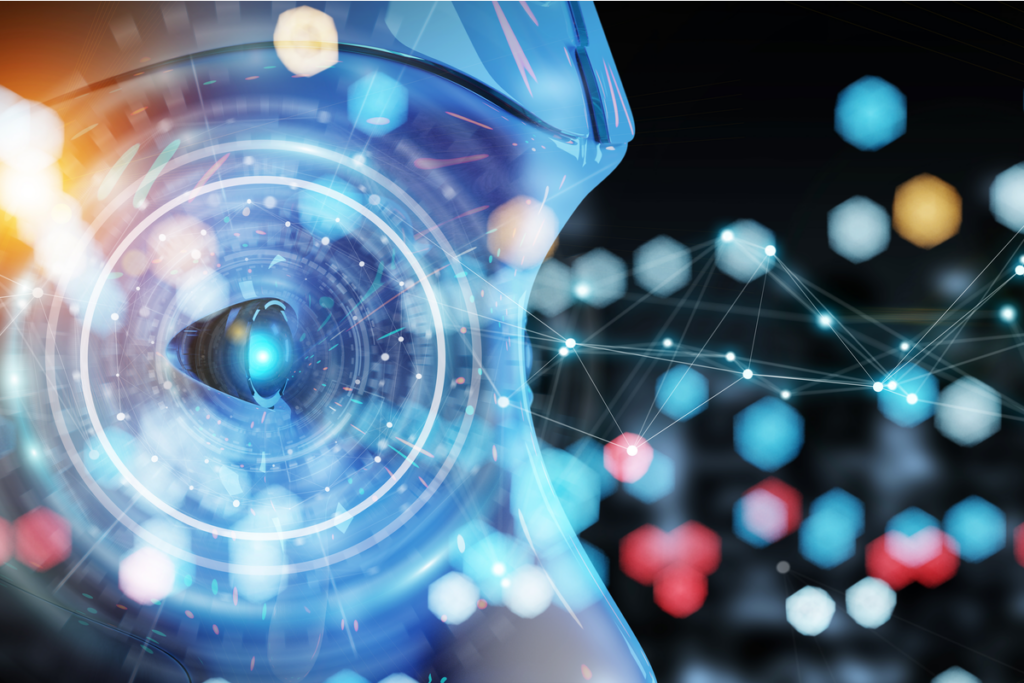The Role of Artificial Intelligence in Mental Health Care


Written and verified by the psychologist Valeria Sabater
The idea of artificial intelligence (AI) as support in mental health care is somewhat disconcerting for many. However, AI has been collaborating in the medical and healthcare fields for years and has made some great advances. The tools it offers facilitate, among other things, a deeper understanding of mental disorders, via the analysis of large amounts of data.
Although certain bioethical aspects require regulation, in the future, this resource will undoubtedly provide innovative solutions in the field of mental health. These will range from improving diagnoses to choosing the most suitable treatments. In fact, AI will be an essential ally for the patient when it comes to their mental health.
Artificial intelligence is still in its infancy, but its growth is unstoppable. It’s gaining presence in many social, medical and health scenarios, including the mental health field.
Artificial intelligence and mental health
Some of us are concerned about the advancement of AI in many areas of our lives. Indeed, technology is developing faster than biology and artificial intelligence is taking an exponential leap. Therefore, it’s not surprising that this tool is making its way into the field of mental disorders and seeking to be a resource for help and progress.
In 2019, the University of California (USA) published a study that highlighted some of the keys to AI being a resource for mental health. It states that among its future advantages will be the identification of psychological conditions at an early or prodromal stage. This will pave the way for the employment of more effective interventions.

How artificial intelligence will help mental health
AI as a resource for mental health is already offering certain innovations. In fact, many of its practical applications and their potential were seen during the COVID-19 pandemic. We’re going to explore its benefits.
- Chatbots are available. Their goal is to study and prevent depression.
- Robots with artificial intelligence have been created to prevent loneliness in the elderly.
- Accurate data makes it possible to ascertain which therapies and treatments are most effective for each patient.
- Chatbots and apps are being developed that provide specific therapeutic content. For example, monitoring a patient’s mood or detecting suicidal ideation.
- In the future, AI will collaborate with mental health professionals, offering advice, strategic guides, and follow-up tools for patients.
- AI will carry out innovative solutions, not only in psychological care but also in prevention. One of the most urgent areas will be preventing suicide.
- AI analyzes large amounts of data. By processing social variables, lifestyle habits, and medical, genetic, and neurological conditions, it can offer important information in the understanding of mental illness.
- It’s a great ally for early diagnosis of many mental disorders. This is confirmed in research published in the journal, Pervasive and Mobile Computing. It claims that AI detects anxiety symptoms with more than 92 percent accuracy.
Artificial intelligence won’t replace the work of a psychologist, it’ll act as an ally in the field of mental health.
Are AI tools already available?
Artificial intelligence is already supporting mental health. In fact, a wide variety of AI tools are available for addressing mental disorders. For example:
- Data analysis and therapeutic decision making.
- Reach Vet. A program developed in the US based on AI, to prevent suicide among war veterans.
- Apps that guide in managing the symptoms of anxiety and depression. For example, Wysa.
- Conversational chatbots that, via text messages, provide emotional support to young people, especially Generation Z.
- Programs like the Crisis Contact Simulator. These are beneficial in training psychologists. For instance, this program can simulate digital conversations with young people from the LGTBI community to help professionals become empowered in the appropriate interventions.
Future opportunities
Artificial intelligence in the field of mental health is a reality that’s already making advances in the short term. However, the future opportunities in this area are immense. But, they must be well regulated if significant progress is to be achieved. It’s expected to take the following directions:
- Ascertain which therapy is the most effective for each individual.
- Offer more accurate and earlier diagnoses.
- Provide timely and closer supervision of patients’ progress.
- Be the best ally in big data or clinical data research.
- Provide better training and support for mental health professionals.
- Reduce and replace drug administration with psychological approaches.
- Provide the entire population with immediate and economic psychological assistance.
- Develop close care mechanisms for the youngest in the population at risk of suicide.
The introduction of artificial intelligence in psychological care will be gradual. The areas in which it’ll be most significant are data analysis, diagnosis, and prevention.

Will AI replace mental health specialists?
Psychological therapy is one of the most humane, sensitive, and empathic processes par excellence. To imagine that tomorrow, an app or a robot will replace a psychologist, completely submerges us in the realm of uncanny valley. But, an algorithm trained in mental health will never 100 percent be able to perform the task of a specialist.
A study published in The Lancet Digital Health confirms this fact. It claims the role of AI will basically be to improve the tasks of diagnosis and prevention of mental illnesses. Advances will be revolutionary as long as there’s a synergy between the strengths of both human and artificial intelligence.
In light of the foregoing, it won’t be possible to exclude the psychologist or psychiatrist from the field of mental health. Indeed, even if users have a chatbot to interact with or monitor their state of mind, the figure of the professional will always be present. On the other hand, AI will undoubtedly be a useful resource for mental health and a great tool for the psychologist. It’ll help treatment become effective and personalized.
The idea of artificial intelligence (AI) as support in mental health care is somewhat disconcerting for many. However, AI has been collaborating in the medical and healthcare fields for years and has made some great advances. The tools it offers facilitate, among other things, a deeper understanding of mental disorders, via the analysis of large amounts of data.
Although certain bioethical aspects require regulation, in the future, this resource will undoubtedly provide innovative solutions in the field of mental health. These will range from improving diagnoses to choosing the most suitable treatments. In fact, AI will be an essential ally for the patient when it comes to their mental health.
Artificial intelligence is still in its infancy, but its growth is unstoppable. It’s gaining presence in many social, medical and health scenarios, including the mental health field.
Artificial intelligence and mental health
Some of us are concerned about the advancement of AI in many areas of our lives. Indeed, technology is developing faster than biology and artificial intelligence is taking an exponential leap. Therefore, it’s not surprising that this tool is making its way into the field of mental disorders and seeking to be a resource for help and progress.
In 2019, the University of California (USA) published a study that highlighted some of the keys to AI being a resource for mental health. It states that among its future advantages will be the identification of psychological conditions at an early or prodromal stage. This will pave the way for the employment of more effective interventions.

How artificial intelligence will help mental health
AI as a resource for mental health is already offering certain innovations. In fact, many of its practical applications and their potential were seen during the COVID-19 pandemic. We’re going to explore its benefits.
- Chatbots are available. Their goal is to study and prevent depression.
- Robots with artificial intelligence have been created to prevent loneliness in the elderly.
- Accurate data makes it possible to ascertain which therapies and treatments are most effective for each patient.
- Chatbots and apps are being developed that provide specific therapeutic content. For example, monitoring a patient’s mood or detecting suicidal ideation.
- In the future, AI will collaborate with mental health professionals, offering advice, strategic guides, and follow-up tools for patients.
- AI will carry out innovative solutions, not only in psychological care but also in prevention. One of the most urgent areas will be preventing suicide.
- AI analyzes large amounts of data. By processing social variables, lifestyle habits, and medical, genetic, and neurological conditions, it can offer important information in the understanding of mental illness.
- It’s a great ally for early diagnosis of many mental disorders. This is confirmed in research published in the journal, Pervasive and Mobile Computing. It claims that AI detects anxiety symptoms with more than 92 percent accuracy.
Artificial intelligence won’t replace the work of a psychologist, it’ll act as an ally in the field of mental health.
Are AI tools already available?
Artificial intelligence is already supporting mental health. In fact, a wide variety of AI tools are available for addressing mental disorders. For example:
- Data analysis and therapeutic decision making.
- Reach Vet. A program developed in the US based on AI, to prevent suicide among war veterans.
- Apps that guide in managing the symptoms of anxiety and depression. For example, Wysa.
- Conversational chatbots that, via text messages, provide emotional support to young people, especially Generation Z.
- Programs like the Crisis Contact Simulator. These are beneficial in training psychologists. For instance, this program can simulate digital conversations with young people from the LGTBI community to help professionals become empowered in the appropriate interventions.
Future opportunities
Artificial intelligence in the field of mental health is a reality that’s already making advances in the short term. However, the future opportunities in this area are immense. But, they must be well regulated if significant progress is to be achieved. It’s expected to take the following directions:
- Ascertain which therapy is the most effective for each individual.
- Offer more accurate and earlier diagnoses.
- Provide timely and closer supervision of patients’ progress.
- Be the best ally in big data or clinical data research.
- Provide better training and support for mental health professionals.
- Reduce and replace drug administration with psychological approaches.
- Provide the entire population with immediate and economic psychological assistance.
- Develop close care mechanisms for the youngest in the population at risk of suicide.
The introduction of artificial intelligence in psychological care will be gradual. The areas in which it’ll be most significant are data analysis, diagnosis, and prevention.

Will AI replace mental health specialists?
Psychological therapy is one of the most humane, sensitive, and empathic processes par excellence. To imagine that tomorrow, an app or a robot will replace a psychologist, completely submerges us in the realm of uncanny valley. But, an algorithm trained in mental health will never 100 percent be able to perform the task of a specialist.
A study published in The Lancet Digital Health confirms this fact. It claims the role of AI will basically be to improve the tasks of diagnosis and prevention of mental illnesses. Advances will be revolutionary as long as there’s a synergy between the strengths of both human and artificial intelligence.
In light of the foregoing, it won’t be possible to exclude the psychologist or psychiatrist from the field of mental health. Indeed, even if users have a chatbot to interact with or monitor their state of mind, the figure of the professional will always be present. On the other hand, AI will undoubtedly be a useful resource for mental health and a great tool for the psychologist. It’ll help treatment become effective and personalized.
All cited sources were thoroughly reviewed by our team to ensure their quality, reliability, currency, and validity. The bibliography of this article was considered reliable and of academic or scientific accuracy.
- Graham, S., Depp, C., Lee, E. E., Nebeker, C., Tu, X., Kim, H. C., & Jeste, D. V. (2019). Artificial Intelligence for Mental Health and Mental Illnesses: an Overview. Current psychiatry reports, 21(11), 116. https://pubmed.ncbi.nlm.nih.gov/31701320/
- Joyce, D.W., Kormilitzin, A., Smith, K.A. et al. (2023). Explainable artificial intelligence for mental health through transparency and interpretability for understandability. npj Digital Medicine, 6(6). https://www.nature.com/articles/s41746-023-00751-9
- Khan, N. S., Ghani, M. S., & Anjum, G. (2021). ADAM-sense: Anxiety-displaying activities recognition by motion sensors. Pervasive and Mobile Computing, 78. https://www.sciencedirect.com/science/article/abs/pii/S1574119221001140?via%3Dihub
- Koutsouleris, N., Hauser, T. U., Skvortsova, V., & De Choudhury, M. (2022). From promise to practice: towards the realisation of AI-informed mental health care. The Lancet. Digital health, 4(11), e829–e840. https://pubmed.ncbi.nlm.nih.gov/36229346/
- Rubeis G. (2022). iHealth: The ethics of artificial intelligence and big data in mental healthcare. Internet Interventions. https://www.sciencedirect.com/science/article/pii/S2214782922000252
This text is provided for informational purposes only and does not replace consultation with a professional. If in doubt, consult your specialist.







